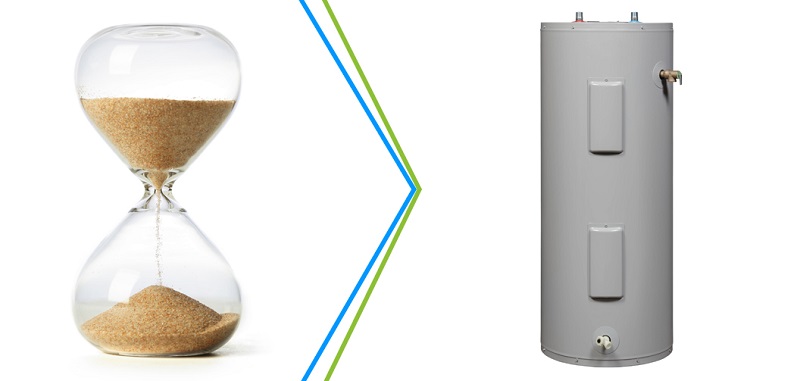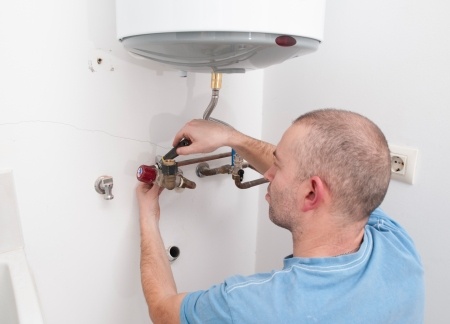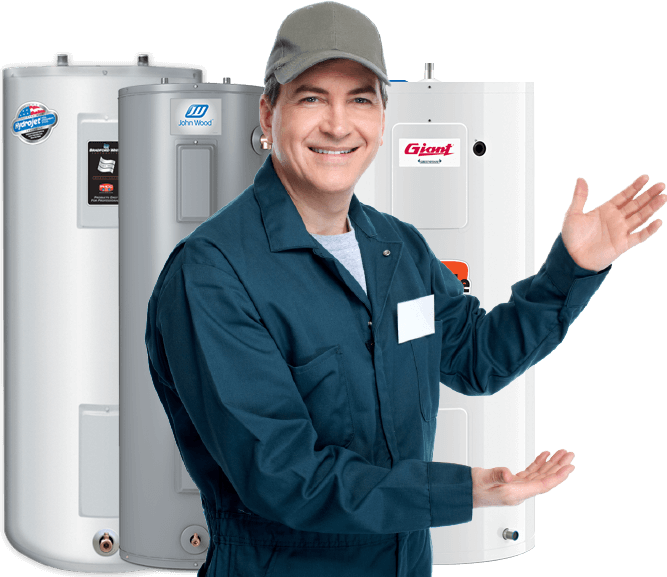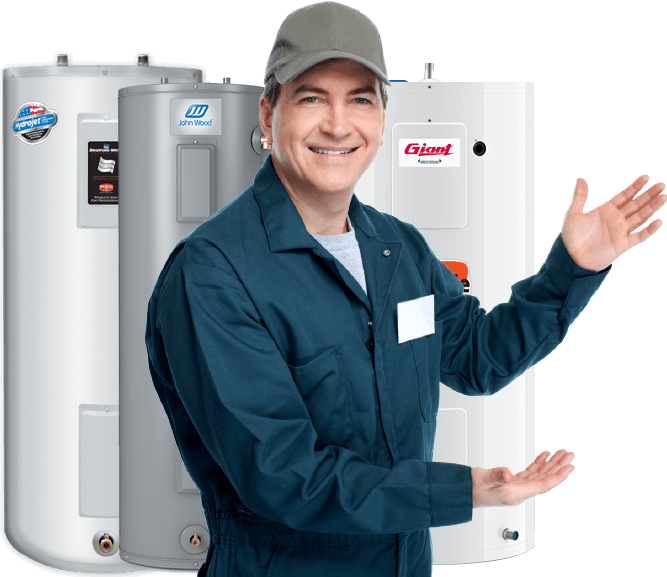
Are you unsure if your water heater is obsolete and you worry about possible water damage? Learn how to spot certain tell-tale signs of wear and the average life of a water heater.
Replace your water heater: water heater damage and service life

How long can you expect your water heater to last? In fact, a water heater can have a life of 20 years to 12 years.
There are several factors to take into consideration to properly estimate the life of a water heater
- Water quality:hard water – that is, high in mineral salts – is likely to reduce the life of your water heater. The limescale residue will stick to the heating elements which will wear out them prematurely.
- Installation: a plumber will make sure to install your water heater correctly. Moreover, some manufacturers encourage their customers to hire a professional and in return, the warranty of the water heater will be extended. It is better for a competent plumber to replace or install your water heater because there are electricity and plumbing standards to follow.
- Maintenance: Generally, a water heater does not require any special maintenance. However, in areas where the water is unusually hard, you may need to check the degree of corrosion on an annual basis. There is also the anode to consider because it destroys limescale deposits. So, you may have to check if it still works.
- The quality of the water heater: There are various types of water heaters that have unique properties. Some manufacturers have thought of ways to extend the life of the water heater with glass-ceramic walls, for example. Taking care of your water heater does not guarantee a specific number of years before replacement becomes necessary. However, some signs of wear are good indicators of the condition of your water heater.
Is your water heater showing signs of wear? Know how to spot them to prevent accidents
The two most common signs of a water heater showing signs of wear are:
- Water temperature: If you notice that the temperature of your water is warmer than usual, it may be a sign that your water heater is in decline. Obviously, once is not customary, but a gradual and continuous decrease is a good sign of wear and tear. If you notice such a drop, monitor the temperature of your water in the next few weeks.
- Less hot water: Did you used to have enough hot water to fill a bath but now lack hot water? It may be time to replace your water heater. So if you notice such a variation in the temperature of your water or in the amount of hot water that you have access to on a daily basis, it is highly possible that your water heater should be replaced soon. Although these are the two most common clues, be sure to stay alert and know how to spot other symptoms of an aging water heater. For example:
- Rust in the bottom of the water heater: If there is rust in the bottom of your water heater, it is best to replace it before a crack causes water damage! In fact, water flows from top to bottom and the presence of rust at such a location can cause a fault that will eventually allow the water to leak. Depending on the size of the crack, your water will escape more or less quickly from your water heater to land on the ground. If your water heater is not in a strategic location (that is, in a location that, in the event of a problem, can reduce the damage), a disaster may follow. So make sure of two things:
- Install your water heater in a location that will minimize the damage, knowing that the best location is on a ceramic floor or directly on the concrete slab next to the floor drain (the latter will allow for better flow of the floor) water in case of problem).
- Be on the lookout for rust: the latter, in addition to being a reliable indicator of aging, warns you of the possibility of a possible leak.
- Change in the color of the water: ifthe water is not as clear as usual, it may indicate the presence of rust in the tank water heater. For example, if you pour a glass of water and the water seems to be more fuzzy than usual (and repetitively), your water heater may be showing signs of wear. Same thing for machine washing: if after washing your clothes you notice discoloration or rust stains on your clothing, check the condition of your water heater or contact a specialist before your water becomes unfit for use and prevent your clothes from being stained when you wash them.
- Moisture on the outer wall: contact a plumber if you find moisture on your water heater as this is a sign that does not lie! Your water heater will need to be replaced.
These are the reasons why the life of a water heater can vary greatly from one house to another!
When to change your water heater? Also a question of insurance
Did you know that some insurers have decided to discontinue insuring water heaters that are more than 10 to 12 years old?
This is a decision based on the potential risk of water damage – a claim that is costly to insurance companies.
Thus, depending on your insurer, your water heater may not be covered after a certain period of time. Remember to check your insurance coverage and, if necessary, contact your insurance company for details.
Although the life of a water heater can be as long as 20 years, you will have to resign yourself to replacing it even before it reaches the age limit for your insurer in order to remain covered in the event of a loss due to the water heater.
Otherwise, if you do not have your water heater replaced before the deadline, you will have to bear full responsibility for your water heater.
Would you like to replace your water heater? Ask 3 plumbers recommended by our team in your area by filling out the form on this page!
Tips & Advice on Extending the Life of Your Water Heater
Now that we have established the importance of being vigilant about water heaters and knowing how to recognize their signs of wear, it is important to address the subject of its life and the various ways how to extend it.
Yes, it is possible to extend the life of your water heater through proper care and maintenance in the years following its installation.
Tip # 1: Choice & Maintenance of Sacrificial Anode
If you live in an area where the water contains a high amount of iron, acid or magnesium, TAKE CARE OF YOUR WATER HEATER. In such a situation, the lifespan of your tank will decrease from 12 years (which is the average life of a water heater in Quebec) to possibly 5 years.
Such quality of water (which has corrosive effects on the materials that make up the heater) can damage your water heater to create a crack, which will then turn into damage.
To prevent such a problem, two words: sacrificial anode. This is an element also found on boat hulls and galvanized pools and acts by cathodic protection. In other words, it protects the metal against corrosion.
The presence of such an anode in your water heater, therefore, retards corrosion of the tank, as long as it does not degrade itself.
That’s why it’s important to check the condition of the anode every year and change it, as needed. Your water heater’s life could be extended by a few more years.
For optimum protection, opt for the current anode. Relatively simple to install, it will not disintegrate and can triple the life of your water heater.
Tip # 2: Handle the valve manually every year
This is a quick and easy process that helps extend the life of your water heater.
The safety valve (also called temperature and pressure relief valve) is a mechanism for evacuating water in the event of overpressure. By operating it manually, we eliminate the tartar or limestone that accumulate to ensure its proper operation.
Tip # 3: Clean the limestone layer on the elements
Limestone harms your water heater in many ways. It can hinder the proper functioning of the safety valve and damage the heating elements.
The standard is to maintain these elements by cleaning the layer of limestone that is deposited there. If the passage of time has already caused the limestone to corrupt the heating elements, it is better to replace the latter so that the heater works under optimal conditions.
Tip # 4: Install a water softener or drain
Finally, if your water has a high iron or magnesium content, you can install a water softener or drain the water heater every year. This process of letting the water run until it is clean removes residues that may have accumulated.
In any case, maintenance won’t do any harm to your water heater. At best, it will allow you to increase its life span by several years.
Choosing a qualified plumber for a reliable water heater installation
As we mentioned, it is best to choose a qualified plumber to install a water heater in your home.
A professional plumber puts at your disposal:
- His knowledge
- His experience
- His valuable advice
- His tools
Specifically, what does the installation of a water heater require?
- Transport in an upright position in a suitable vehicle
- Find a suitable location for ideal water heater performance
- Verification of the electrical system and the electrical connection
- Weld fittings on cold water and hot water inlet pipes
- Install a safety valve
- and more.
While it may be tempting to replace your own water heater, the best step is to let a professional take charge of the work to achieve optimal results.
Find professional plumbers to replace your water heater
To find a quality plumber who can install or replace your water heater, Compare Home Quotes – Water Heaters have the perfect solution for you.
Simply fill out our form to receive up to 3 free submissions from our plumber partners.
You can then choose the most attractive offer and proceed with the installation of your water heater that complies with industry standards.
You can get the best prices for the installation or purchase of your water heater.
Don’t waste time contacting a plumber one at a time when we can easily find professionals for your needs. Take advantage of our free service!













